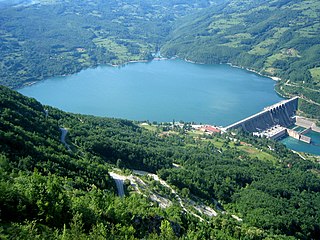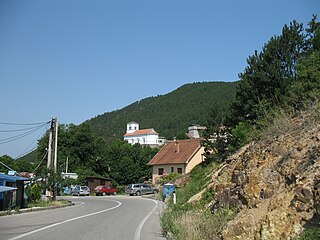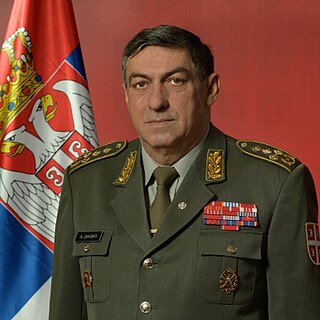Related Research Articles

The Kosovo War was an armed conflict in Kosovo that lasted from 28 February 1998 until 11 June 1999. It was fought between the forces of the Federal Republic of Yugoslavia, which controlled Kosovo before the war, and the Kosovo Albanian rebel group known as the Kosovo Liberation Army (KLA). The conflict ended when the North Atlantic Treaty Organization (NATO) intervened by beginning air strikes in March 1999 which resulted in Yugoslav forces withdrawing from Kosovo.

The Kosovo Liberation Army was an ethnic Albanian separatist militia that sought the separation of Kosovo, the vast majority of which is inhabited by Albanians, from the Federal Republic of Yugoslavia (FRY) and Serbia during the 1990s. Albanian nationalism was a central tenet of the KLA and many in its ranks supported the creation of a Greater Albania, which would encompass all Albanians in the Balkans, stressing Albanian culture, ethnicity and nation.
Since the establishment of the United Nations Mission in Kosovo (UNMIK) in 1999, it has been reported to the international community that Kosovo is a major destination territory for human trafficking, women and young girls trafficked into forced prostitution. According to Amnesty International, most of women are trafficked from Moldova, Romania, Bulgaria and Ukraine.

The Višegrad massacres were acts of mass murder committed against the Bosniak civilian population of the town and municipality of Višegrad during the ethnic cleansing of eastern Bosnia by Serb police and military forces during the spring and summer of 1992, at the start of the Bosnian War.

The Suva Reka massacre refers to the mass murder of Kosovo Albanian civilians committed by Serbian police officers on 26 March 1999 in Suva Reka, Kosovo, during the 1999 NATO bombings of Yugoslavia.

The Drenica massacres were a series of killings of Kosovo Albanian civilians committed by Serbian special police forces in the Drenica region of central Kosovo.

Numerous war crimes were committed by all sides during the Kosovo War, which lasted from early 1998 until 11 June 1999. According to Human Rights Watch, the vast majority of abuses were attributable to the government of Slobodan Milošević, mainly perpetrated by the Serbian police, the Yugoslav army, and Serb paramilitary units. During the war, regime forces killed between 7,000–9,000 Kosovar Albanians, engaged in countless acts of rape, destroyed entire villages, and displaced nearly one million people. The Kosovo Liberation Army has also been implicated in atrocities, such as kidnappings and summary executions of civilians. Moreover, the NATO bombing campaign has been harshly criticized by human rights organizations and the Serbian government for causing numerous civilian casualties, with estimates ranging from roughly 500 to over 2,500.

Serbia was involved in the Yugoslav Wars, which took place between 1991 and 1999—the war in Slovenia, the war in Croatia, the war in Bosnia, and in Kosovo. From 1991 to 1997, Slobodan Milošević was the President of Serbia. Serbia was part of the Federal Republic of Yugoslavia (FRY). The International Criminal Tribunal for the Former Yugoslavia (ICTY) has established that Milošević was in control of Serb forces in Bosnia and Herzegovina and Croatia during the wars which were fought there from 1991 to 1995.

The Vushtrri massacre was the mass killing of Kosovo Albanian refugees near Vushtrri, during the Kosovo War on 2–3 May 1999.

Lake Perućac is an artificial lake on the Drina River, on the border between Bosnia and Herzegovina and Serbia. It was created in 1966 and occupies a natural bend of the river, which encircles the Tara mountain, between towns of Višegrad in Bosnia and Bajina Bašta in Serbia.

Rudnica is a village in the municipality of Raška, Serbia.

Amor Mašović, is a Bosnian politician and Chairman of the Bosnian Federal Commission for Missing Persons. During the Bosnian War, Amor Mašović was the person responsible on the Bosnian government side for negotiating prisoner exchanges and was involved in the ultimately fruitless negotiations for the exchange of Col. Avdo Palić, the "disappeared" commander of the enclave of Žepa
Humanitarian Law Center (HLC) is the Serbian non-governmental organisation with offices in Belgrade, Serbia, and Pristina, Kosovo. It was founded in 1992 by Nataša Kandić to document human rights violations across the former Yugoslavia in armed conflicts in Croatia, Bosnia and Herzegovina, and, later, Kosovo.

Ljubiša Diković is the former Chief of General Staff of the Serbian Armed Forces from 12 December 2011 to 14 September 2018. He previously served as Commander-in-Chief of the Serbian Land Forces.

The war crimes trial of Slobodan Milošević, the former President of the Federal Republic of Yugoslavia, at the International Criminal Tribunal for the former Yugoslavia (ICTY) lasted for just over four years from 2002 until his death in 2006. Milošević faced 66 counts of crimes against humanity, genocide, and war crimes committed during the Yugoslav Wars of the 1990s. He pleaded not guilty to all the charges.
The Staro Gracko massacre was the mass killing of 14 Kosovo Serb farmers in the village of Staro Gracko in the Kosovo municipality of Lipjan on 23 July 1999. The killings occurred after Yugoslav troops withdrew from the region in the aftermath of the Kosovo War, and was the worst single crime in Kosovo since the conflict ended in June 1999. As of 2019 the perpetrators of the killings have never been found and held accountable.
The Meja massacre was the mass execution of at least 377 Kosovo Albanian civilians during the Kosovo War, which took place on 27 April 1999. Of the victims, 36 were under 18 years old. It was committed by Serbian police and Yugoslav Army forces in the Reka Operation which began after the killing of six Serbian policemen by the Kosovo Liberation Army (KLA). The executions occurred in the village of Meja near the town of Gjakova. The victims were pulled from refugee convoys at a checkpoint in Meja and their families were ordered to proceed to Albania. Men and boys were separated and then executed by the road. It is one of the largest massacres in the Kosovo War. Many of the bodies of the victims were found in the Batajnica mass graves. The International Criminal Tribunal for the former Yugoslavia has convicted several Serbian army and police officers for their involvement.
The Batajnica mass graves, are graves that were found in 2001 near Batajnica, a suburb of Belgrade, the capital of Serbia. The graves contained the bodies of 744 Kosovo Albanians, civilians, killed during the 1998-99 Kosovo War.
The Ugljare mass grave is a burial site in the village of Ugljare in the Kosovo municipality of Gjilan. Those buried include Kosovo Serbs and possibly Kosovo Albanians sometime around July 1999. At the time, it was the only case which involved in the Kosovo war crimes tribunal the investigation of a crime against civilians which was possibly committed by Albanians against Serbs. No perpetrators have been found. Kosovo leaders during the war, including former Prime Minister and the "George Washington of Kosovo", Hashim Thaci, are currently on trial for crimes against humanity, murder, forced deportation, kidnapping, and persecution of Serbs and other minorities in a specially commissioned court, The Kosovo Specialist Chambers, established to prosecute Albanian leaders for crimes during and after the Kosovo War.
The Mališevo mass grave is a grave found in 2005 in the town of Mališevo, Kosovo. The grave contained the bodies of 12 Serb civilians and 1 ethnic Bulgarian, executed during the Kosovo War by the Kosovo Liberation Army (KLA).
References
- ↑ Borger, Julian (10 May 2010). "Kosovo Albanian mass grave found under car park in Serbia". The Guardian. Retrieved 19 November 2020.
- ↑ Perić, Vesna (11 May 2010). "250 ethnic Albanians found in mass grave". The Independent. Retrieved 19 November 2020.
- ↑ "Dossier: The cover-up of evidence of crimes during the war in Kosovo: THE CONCEALMENT OF BODIES OPERATION" (PDF). Humanitarian Law Center. Retrieved 19 November 2020.
- ↑ "Repatriation of remains of 12 missing persons identified from the remains excavated in Rudnica of Raska in Serbia". Press Office of the Prime Minister of Kosovo. Retrieved 19 November 2020.
- 1 2 3 4 Orentlicher, Diane (2018). Some Kind of Justice: The ICTY's Impact in Bosnia and Serbia. Oxford University Press. p. 417. ISBN 978-0190882297.
- ↑ Kostić, Milica (2019). ""New time" for the Missing from Kosovo". Balkan Perspectives. Retrieved 19 November 2020.
- ↑ Stojanović, Milica (17 November 2020). "Suspected Mass Grave of Kosovo War Victims Found in Serbia". Balkan Insight. Retrieved 19 November 2020.